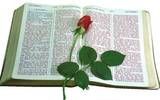August 20 - John 6:51-58

Daily Reading & Meditation
Sunday (8/20): "He who eats this bread will live forever"
Scripture: John 6:51-58
51 I am the living bread which came down from heaven; if any one eats of this bread, he will live for ever; and the bread which I shall give for the life of the world is my flesh." 52 The Jews then disputed among themselves, saying, "How can this man give us his flesh to eat?" 53 So Jesus said to them, "Truly, truly, I say to you, unless you eat the flesh of the Son of man and drink his blood, you have no life in you; 54 he who eats my flesh and drinks my blood has eternal life, and I will raise him up at the last day. 55 For my flesh is food indeed, and my blood is drink indeed. 56 He who eats my flesh and drinks my blood abides in me, and I in him. 57 As the living Father sent me, and I live because of the Father, so he who eats me will live because of me. 58 This is the bread which came down from heaven, not such as the fathers ate and died; he who eats this bread will live for ever."
Meditation: Why did Jesus offer himself as “food and drink” (John 6:53)? The Jews were scandalized and the disciples were divided when Jesus said "unless you eat my flesh and drink my blood, you have no life in you." What a hard saying, unless you understand who Jesus is and why he calls himself the bread of life. The miracle of the multiplication of the loaves (John 6:1-15), when Jesus said the blessing, broke and distributed the loaves through his disciples to feed the multitude, prefigured the superabundance of the unique bread of the Eucharist, or Lord’s Supper. The Gospel of John has no account of the Last Supper meal (just the foot washing ceremony and Jesus' farewell discourse). Instead, John quotes extensively from Jesus' teaching on the bread of life.
In the Old Covenant bread and wine were offered in sacrifice as a sign of grateful acknowledgment to their Creator. Melchizedek’s offering of bread and wine, who was both priest and king (Genesis 14:18), prefigured the offering made by Jesus, our high priest and king. The remembrance of the manna in the wilderness recalled to Israel that it lives by the bread of the Word of God (Deuteronomy 8:3).When at the Last Supper Jesus described his blood “poured out for many for the forgiveness of sins” (Matthew 26:28), he was explaining his coming crucifixion as a sacrifice for sins. His death on the cross fulfilled the sacrifice of the paschal lamb. That is why John the Baptist called him the “Lamb of God who takes away the sins of the world.” Jesus made himself an offering and sacrifice, a gift that was truly pleasing to the Father. He “offered himself without blemish to God” (Hebrews 9:14) and “gave himself as a sacrifice to God” (Ephesians 5:2).
Jesus chose the time of Passover to fulfill what he had announced at Capernaum– giving his disciples his body and his blood. Jesus’ passing over to his Father by his death and resurrection, the new Passover, is anticipated in the Last Supper and celebrated in the eucharist, which fulfills the Jewish Passover and anticipates the final Passover of the church in the glory of God’s kingdom. When the Lord Jesus commands his disciples to eat his flesh and drink his blood, he invites us to take his life into the very center of our being. That life which he offers is the very life of God himself.


0 Comments:
Post a Comment
<< Home